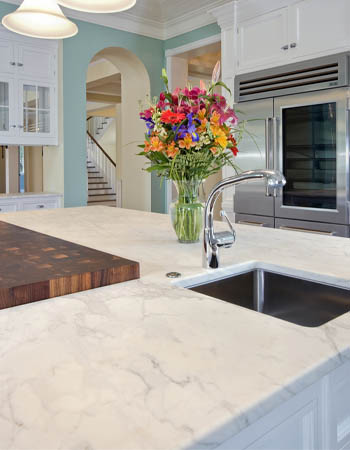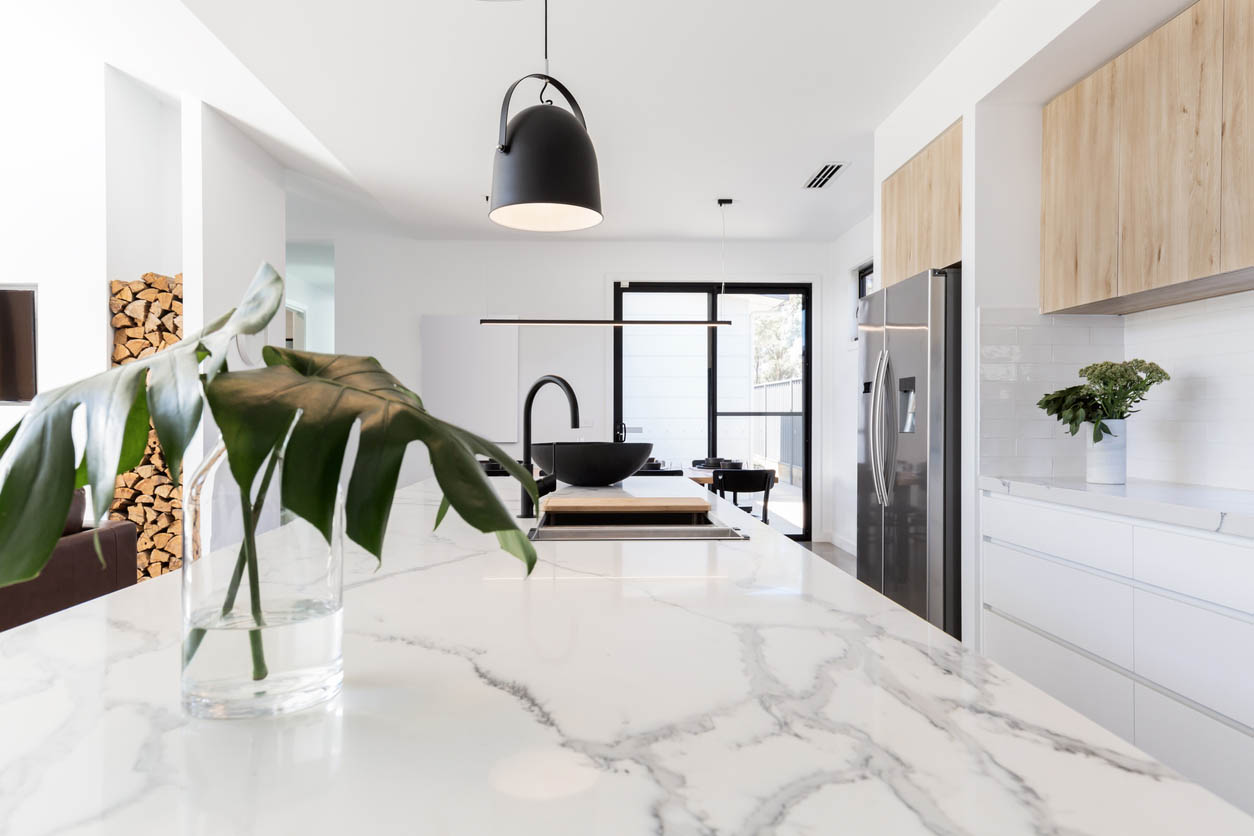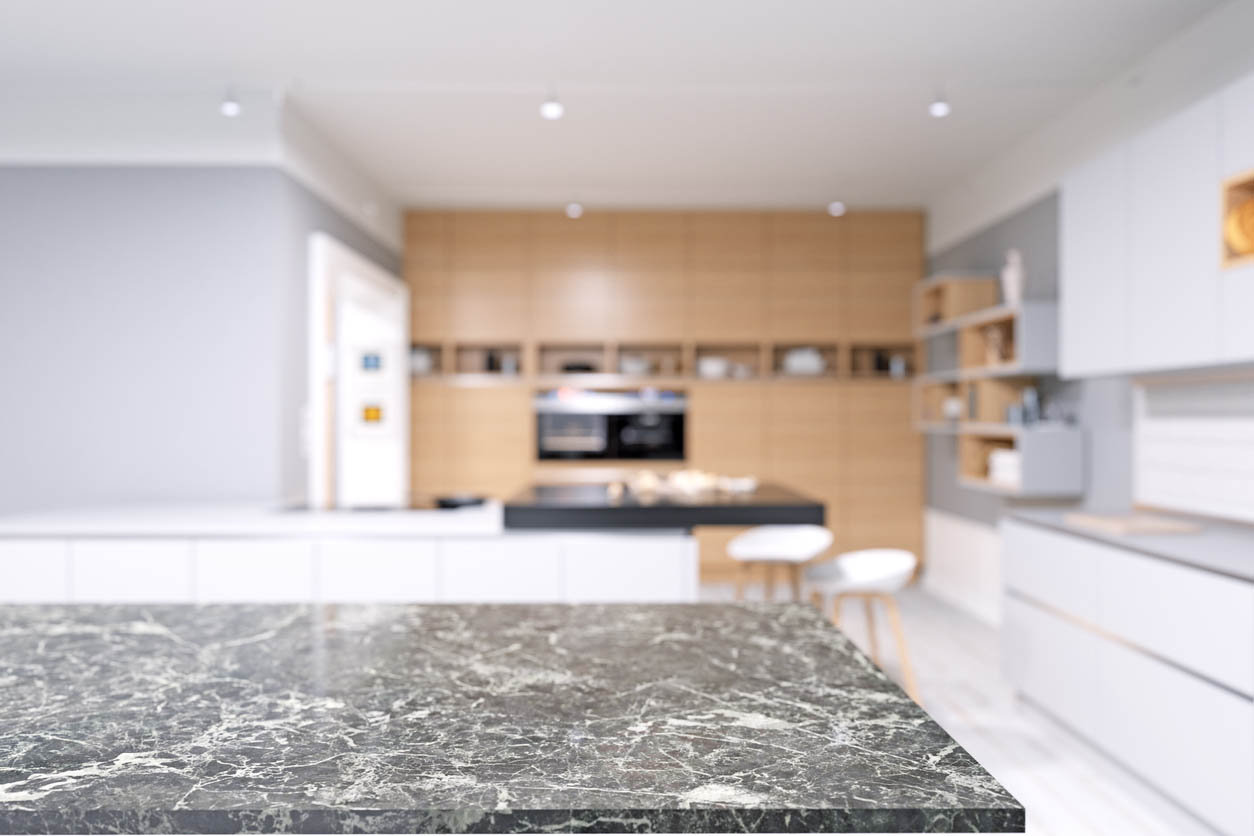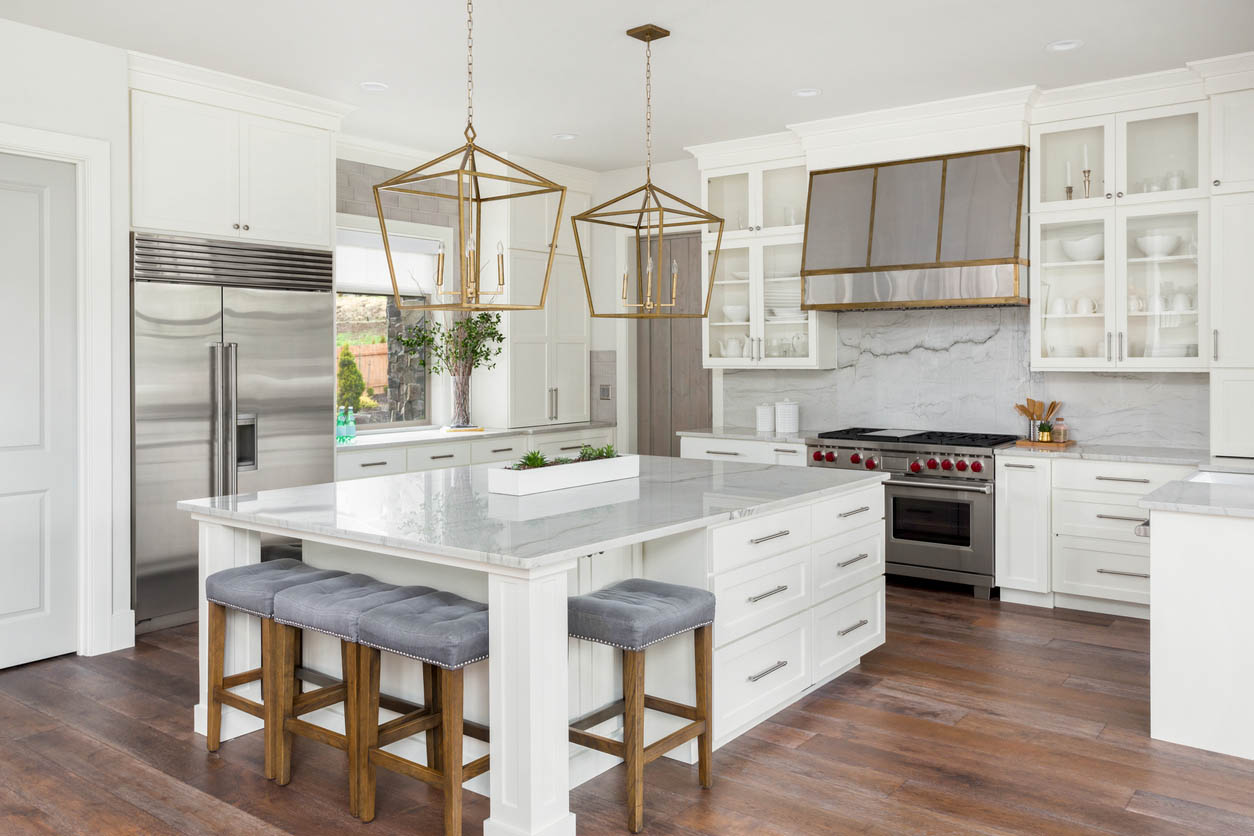We may earn revenue from the products available on this page and participate in affiliate programs. Learn More ›
- Typical Range: $2,000 to $5,000
- National Average: $3,000
The natural beauty of marble can add elegance and sophistication to any home. Marble countertops come in a variety of colors, patterns, and veining. This metamorphic stone is relatively hard and durable and makes excellent countertops. Distinguished by veins of color, no two marble slabs are alike. Marble kitchen countertops can vary in price due to the type of marble; the color, grade, and thickness; the cost of labor; and how far the material has to travel. According to HomeAdvisor, marble slab countertops can range from $40 to $100 per square foot, with an average price of $60 per square foot. For 50 square feet of counter space, homeowners can expect to pay between $2,000 and $5,000, with the national average at $3,000. Labor can average between $35 and $45 per hour, but costs may differ in your area. Any extra supplies needed for the installation project typically cost between $100 and $200. All of these price factors can impact the overall marble countertop cost. To find experienced professionals to install the marble countertops of your dreams, search online for “marble countertops near me.”
How to Calculate Marble Countertops Cost

80 percent of the cost of marble countertops comes from the material and any modifications the material undergoes. This means that the square footage of your countertops and the quality of marble you choose will most significantly impact what you end up paying for marble countertops. Labor makes up another 15 percent of the cost, and any additional supplies make up the final 5 percent of the cost.
Factors in Calculating Marble Countertops Cost
Several factors can impact marble countertop cost. Prices can differ from the national average due to the amount of marble needed, grading, color, edge treatment, finish, labor costs, and any additional supplies and materials necessary.
Amount of Marble Needed
Marble comes in different colors, thicknesses, and grades. If a particular type of marble is rare, it will be more expensive than more common types of marble. This is why the cost of marble per square foot can range from $40 to $100, with the average cost around $60.
Grading, Type, and Color of Marble
All marble is graded A to D, with grade A marble costing more than the B through D graded material. The grading is based primarily on the appearance and if the marble slab has any blemishes or defects.
- A: minimal flaws, no repairs, and subtle veining
- B: a few flaws, some visible pitting, and fissures
- C: some factory repair required
- D: pronounced veins, bright colors, and considerable damage requiring repair
Marble comes in varying types of vein patterns and colors. Even slabs of marble from the same quarry can look very different. The kinds of marble are typically named for where they were quarried and their characteristics. The most common types of marble are usually less expensive than a rare, hard-to-find example. Marble can come in white, soft gray, various hues of beige and tan, light gold, dark gray, black, brown, and even orange and pink. Prices can vary from color to color and within the same color hues.
Edge Treatment and Finish
Like other types of stone countertops, marble can have additional edge treatments. Some edge treatments, such as a square or an eased edge, may come with the price of the countertop, so be sure to check with the installer. Other edge finishes that cost between $10 and $12 per linear foot are beveled and half- and full-bullnose. Some edge options, such as ogee, miter, Dupont, and quirk, can run from $20 to $25 per linear foot. The decorative French cove can cost between $30 and $35. Built edges, such as double bevel, Dupont square, and Cole Smith, can run between $36 and $40 per linear foot.
Although some marble countertops can come in different finishes, other types are only available in one finish.
- Polished. Every type of marble countertop can come with a glossy, shiny finish. This finish rarely costs extra beyond the price of materials and labor. A polished finish will reveal pits and imperfections in the marble and show debris and grime. This type is sometimes the only finish available for softer styles of marble.
- Honed. Honing gives the marble countertop a smooth, matte finish and can be used on most marble types. A honed finish comes in different grades depending on the sheen. A high-honed countertop will have a slight sheen and show more wear and marks than a rough-honed finish. This finish can cost between $10 and $20 per square foot.
- Leathered. A leathered finish can run between $20 and $30 per square foot. The fabricator rotates a diamond-tipped brush over the surface to attain the uneven texture of this finish. Not all types of marble are strong enough to have a leathered finish without crumbling, and this finish does not have a reflective surface.
- Caressed. Caressed finishes cost between $30 and $35 per square foot. If the marble countertop you choose is suitable for leathering, a caressed finish is also an option. The highest part of the marble is shined with a polish so the finish has a slight shine in addition to the texture of leathering. Not all fabricators will provide this type of finish, so be sure to double-check if this is the countertop texture you want.
Installation and Labor
Labor typically runs between $35 and $45 per hour, with the total cost of labor around $350 to $450. Complex kitchen layouts requiring multiple cutouts will take longer and therefore cost more in labor. Labor prices will vary depending on the cost of living in the area and the demand for countertop installers.
Additional Supplies and Materials
Extra supplies needed for marble countertop installation usually account for about 5 percent of the total cost. On average, this can range from $100 to $200. These supplies include countertop installation essentials like caulk, screws, and bolts.

Additional Costs and Considerations
When budgeting for marble countertop costs, it’s good to know any additional price factors and considerations that could increase the overall cost. These can include old countertop removal, refinishing, repairs, and additional treatments and installations.
Removing Old Countertops
The removal and disposal of the existing countertop may cost extra. Some countertop installation companies may include the service with the installation price, but it’s always a good idea to double-check. Some companies may charge a removal fee of between $100 and $300. The range in price can depend on the condition of the old countertop. If it’s made from natural or engineered stone and can be refurbished, the company may offer a discount to remove it.
Refinishing
Refinishing a marble countertop will restore its luster and remove surface staining. Refinishing involves grinding down the countertop and evenly polishing the surface. Costs for refinishing can vary due to the size and condition of the counter, but they typically range from $500 to $1,200, which is considerably less expensive than replacing it with another marble countertop. Remember that refinishing doesn’t remove deep stains, pits, or gouges.
Repairs and Additional Treatments
Depending on the type of marble, a DIY kit can take care of a minor repair. A marble repair kit usually costs about $40 from a local hardware store, and it can fix small chips and other minor damage. If the countertop has significant damage, a professional can take care of it. Expect to pay between $200 and $600 for the repair itself and about $75 per hour for labor. Additional sealing to stave off staining can cost between $100 and $200, depending on how long it takes to apply and the type of sealer. Some kinds of marble require chemical treatment to ensure it’s waterproof.
Additional Installations
Some additional installations can also increase the cost of the project. Installing a 4-inch backsplash made from the same material as the countertops can add another $600 on average. Even if you decide on a different material, the average price of a backsplash can run from $900 to $2,500. The cost for a sink cutout is usually $100, not including plumbing and hookup. If a cooktop cutout is needed, that also costs approximately $100, although the price of the cooktop and installation can cost from $500 to $1,000.
Types of Marble Countertops
Once you’ve decided on marble countertops, you’ll have to determine the type of marble to install. Marble countertops come in differing vein patterns and colors, and knowing the advantages of each can help in the decision-making process. To find the types of marble available in your area, search online for “marble slab near me.”
- Carrara. The most common and affordable type of marble, Carrara marble countertops cost approximately $40 per square foot. Although it’s technically classified as white marble, it comes in varying shades of white and light gray with gray veining, and it can have hints of gold. It can be found in various thicknesses, including 2 and 3 inches. It’s a porous marble that needs additional sealing to be used in bathrooms and kitchens.
- Makrana. Mined in India, Makrana marble is often challenging to find in the United States. For $12 per square foot, it’s a budget-friendly strong marble that can be found in sculptures and architecture all over the world. It works well in kitchens due to its density and milky white color with brown or gray veins.
- Pink. Pink marble requires a special order from Turkey and is sometimes hard to find in the United States. It costs about $25 per square foot and has a pink or rose background with red veining and brown and golden tones. This porous stone needs additional sealing to be used in bathrooms and kitchens.
- Cultured. Cultured stone is an artificial marble that consists of resin, stone, and pigments manufactured in molds. It’s nonporous and works well for flooring, bathrooms, and kitchens. It’s often less expensive than most natural marble at $65 per square foot.
- Black. Black marble, also known as Travertine, costs approximately $75 per square foot. Spanish marble is black with white veins and works well in kitchens and bathrooms, but it needs additional treatment and sealing to prevent scratching and prevent water damage.
- Statuario. Statuario marble costs about $50 per square foot. This Italian marble is white with thicker gray veins. It’s prone to stun marks or bruises if it’s struck or something heavy is dropped on it. It also needs additional treatment for use in kitchens and bathrooms.
- Danby. Quarried in the United States, Danby marble is denser and less porous than its Italian counterparts. It’s a white stone with dark gray and sometimes gold veining. Danby marble is considered more eco-friendly since it’s mined in Vermont, and there are no international shipping costs. Expect to pay about $80 per square foot.
- Calacatta. Known as the most expensive marble for countertops, Calacatta marble sells for approximately $180 per square foot. Calacatta marble makes beautiful white marble countertops and has a bright white background with gold and gray veins. Some varieties have more gold or a soft pink undertone. It is porous, requiring chemical treatment for kitchen or bathroom use.

Benefits of Choosing Marble Countertops
Natural marble countertops can add a bright and subtle beauty to any home. There are several benefits to using marble countertops in a kitchen or bathroom, and here are some reasons homeowners choose marble countertops for their homes.
Durability and Longevity
While it needs a bit more maintenance than granite, marble is scratch and crack resistant and will last a very long time with proper care.
Heat Resistance
A marble countertop is heat resistant and will not melt or burn. However, it is recommended to use protection when placing a hot pot or pan onto a marble surface to protect the finish.
Benefits for Bakers
Since marble countertops stay cool to the touch, it’s an ideal surface that works well for rolling out pastry dough. It’s also easy to clean, so bakers don’t have to worry about flour and butter ruining the surface.
Aesthetic
Marble countertops come in an array of colors with varying patterns and veining. Each marble slab is unique and can add richness and beauty to any kitchen or bathroom.
Cost
Although the overall price of marble can vary depending on the type, color, and thickness, marble countertops are typically less expensive than quartz, granite, or other natural stone options.
Return on Investment
The presence of marble countertops will increase the value of your home. Marble countertops and backsplashes have an almost 75 percent return on investment.
Easy Maintenance
Since marble is a porous stone, it requires additional sealing and treatment to resist etching and staining. Once treated, marble countertops are easy to maintain with a mild cleanser and a soft cloth. It’s recommended to wipe dark-colored liquids like balsamic vinegar or red wine immediately to prevent staining.
Marble Countertops Installation: DIY vs. Hiring a Professional
Since marble weighs approximately 18 pounds per square foot, a large slab used for a countertop could weigh close to 550 pounds. Attempting to lift and maneuver it with the help of a few friends as a DIY project would be very difficult without the right equipment and experience. If the marble is dropped or bumped, the cost of replacing it would exceed any type of savings of installing the countertops on your own. An experienced professional knows the ins and outs of installing marble countertops and avoiding cracks or stress fractures. Those with experience installing marble countertops can save money on labor costs, but the rest of us should leave this project to the professionals.

How to Save Money on Marble Countertops
Marble countertop costs can be high, and the additional fees associated with the project can quickly add up. One way to save money on marble countertops is to install the cheapest marble you can find, but there are other ways to save without compromising the quality and the options you want.
- Get multiple quotes. Get at least three quotes from reputable marble countertop professionals in your area.
- Buy local. Buying marble that’s been quarried right here in the United States will avoid additional costs from import taxes and international shipping.
- Go for simple edges. Choosing an elaborate edge for marble countertops can quickly drive up the project’s overall price. Some fabricators include square or eased edges with the price of the marble material, so be sure to double-check.
- Look for overstock. Some fabricators may have unused product or overstock that they’re willing to sell at a discounted rate. If they have a slab that wasn’t used for a previous job or floor tiles that can be installed as a countertop, it could save a significant amount of money.
- Keep an open mind. If the cost of marble countertops is outside your budget, a look-alike stone may be a budget-friendly option.
- DIY prep work. Doing some prep work before installation, such as removing the old countertop and clearing appliances, can save on labor costs.
Questions to Ask About Marble Countertops
Asking the right questions about marble countertop costs can minimize miscommunication and save money. Here are some questions to ask a marble countertop professional.
- What are your credentials?
- Do you have references?
- Are you insured?
- How many square feet of marble does your business install every year?
- Is the fabrication center automated?
- How long will the installation take to complete?
- How do you prep and clean the installation site?
- Who will install the countertop?
- What finishes are available?
- How is the marble sealed?
- How should I maintain the countertops?
- What type of warranty do you have?
FAQs
Deciding on marble countertops while staying within your budget can be a daunting process. Here are some frequently asked questions about marble countertop costs to help guide you in your decisions.
Q. What is the most expensive type of marble?
The most expensive type of marble is typically Calacatta marble. It sells for approximately $180 per square foot.
Q. Which is cheaper: granite, quartz, or marble?
Prices of granite, quartz, and marble can vary according to quality, thickness, and color, but marble is usually the cheaper of the three materials. Marble installation costs around $3,000, granite installation averages $3,500, and quartz installation runs approximately $8,000.
Q. What’s the difference between solid surface, engineered stone, and marble?
Marble is a naturally occurring stone that is quarried and then modified to fit the measurements of a kitchen or bathroom. Engineered stone is made of resin and quartz, and the solid surface consists of pigments, resins, and minerals to create a stone-like surface.
Q. What’s the best type of marble for kitchen and bathroom countertops?
The best type of marble for kitchen and bathroom countertops is cultured marble. While not a naturally occurring stone, cultured marble is nonporous, which is stain resistant and will not harbor bacterial growth.
Q. Can marble increase the value of my house?
Upgrading flooring, countertops, and backsplashes to marble can increase the overall return on investment to almost 75 percent.
Sources: HomeAdvisor, Fixr, HomeGuide


